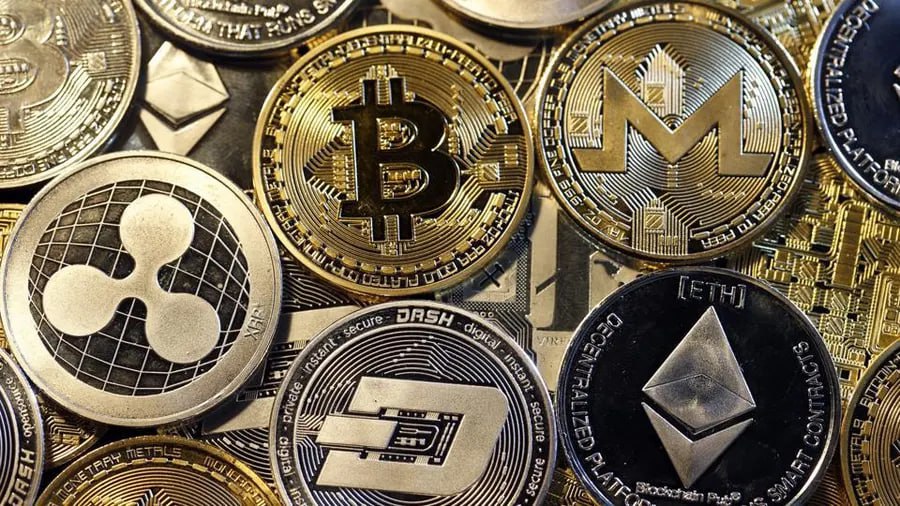Web3 technology and cryptocurrencies have created many new opportunities for investors and businesses, but new security challenges come with these advancements. During the development and growth of PlasBit, one of our main focuses has been to ensure the most secure way to own cryptocurrency and to guarantee the best security for holders. That's why we've extensively researched cryptocurrency mechanisms to ensure the best protection for users' funds. Our goal is to prevent and secure against any system failure. We will give an overview of the security features found in popular cryptocurrencies and assess their effectiveness in mitigating security risks. Through this study, we aim to determine which cryptocurrency is the most secure. Additionally, we'll explore best practices for enhancing security and minimizing the risk of theft or loss. Finally, readers will better understand the strengths and weaknesses of various cryptocurrency security models to protect their investments in the decentralized world of Web3.
How Secure Is Cryptocurrency?
Cryptocurrencies rely on various security features to protect against common threats like hacking, fraud, and theft. So, what could make a cryptocurrency the most secure? Some of the critical components that make a cryptocurrency secure are:
Decentralized Storage:
Cryptocurrencies store data on a decentralized network of computers called the blockchain. The data is replicated across multiple nodes, ensuring redundancy and resilience. Additionally, cryptographic techniques secure the data, preventing unauthorized access or modification. Decentralized storage on the blockchain provides a highly secure and reliable solution for storing data.
Cryptography:
Cryptography allows secure transactions and protects user identities. Cryptographic algorithms like SHA-2 and RSA ensure that transactions are safe and that only the intended recipient can access the funds.
Consensus Algorithms:
Proof of Work(PoW) and Proof of Stake (PoS) validate transactions and ensure the blockchain is secure. These protocols require a certain amount of computing power or stake in the cryptocurrency to validate transactions in the network, making it more difficult for bad actors to take control of the blockchain.
Open-Source Code:
Many cryptocurrencies are built on open-source code, meaning anyone can view and contribute to the code. Open-source code helps ensure vulnerabilities, quickly identifying and patching bugs and improving overall security.
Strong Community:
A strong community of developers, investors, and users is essential for maintaining the security of a cryptocurrency. Community members can help identify and mitigate security risks, and a thriving community can help prevent malicious actors from gaining a foothold in the network. By combining these security features, cryptocurrencies can provide high security and protection for their users.
Blockchain Trilemma and Security
Regarding the security of cryptocurrencies, the blockchain trilemma plays a crucial role. It is one of the fundamental challenges faced by blockchain technology. This concept proposes that it is not feasible to attain all three of the following properties simultaneously:
Decentralization:
Refers to the idea that the network is spread across many different nodes rather than controlled by a central authority. It makes the network more resistant to attacks, causing it to be slower and more challenging to scale and making any system upgrades slower.
Security:
Refers to the ability of the network to resist attacks from hackers or malicious actors. A secure network is essential to ensure the integrity of the blockchain, but it isn't easy to guarantee this without sacrificing decentralization and scalability.
Scalability:
Refers to the ability of the network to handle a large volume of transactions quickly and efficiently. A scalable network is necessary for the widespread adoption of blockchain tech but may come at the expense of decentralization and security. Blockchain involves a trade-off between decentralization, security, and scalability. However, prioritizing security makes it possible to create the most secure cryptocurrency likely while still addressing the other two aspects. As a result, blockchain networks that prioritize decentralization and safety can sometimes need help with scalability. On the other hand, prioritizing scalability can sometimes compromise decentralization and security. By investing in robust and trustworthy infrastructure, utilizing advanced encryption methods, and leveraging decentralized systems, we can create the most secure cryptocurrency possible without compromising other essential aspects of the blockchain trilemma. Different blockchain platforms have attempted to address the blockchain trilemma in different ways. For example, Bitcoin prioritizes decentralization and security over scalability. Therefore, its network uses a Proof of Work (PoW) consensus mechanism that requires much computational power to maintain the network. As a result, it makes the network more secure, but it also limits its scalability. Other blockchain platforms like Ripple and Solana prioritize scalability over decentralization and security. For example, Ripple uses a unique consensus mechanism called the Ripple Protocol Consensus Algorithm (RPCA) that allows the network to handle a large volume of transactions quickly and efficiently. Likewise, Solana uses a Proof of History (PoH) consensus mechanism that enables the network to take up to 65,000 transactions per second, making it one of the fastest available blockchain platforms. In conclusion, the trade-off between decentralization, security, and scalability is difficult to balance, and different blockchain platforms have attempted to address this challenge in different ways. As the blockchain industry continues to evolve, new solutions will likely emerge that enable a more balanced approach to the blockchain trilemma, for example, by using sharding or lighting networks.

Comparing the Security of Popular Cryptocurrencies
Some cryptocurrencies have more robust security features than others, making them less susceptible to hacking, fraud, and theft. Let's explore them and analyze which cryptocurrency is the most secure.
Bitcoin (BTC):
Is Bitcoin the most secure cryptocurrency? It is the world's most famous cryptocurrency, with a market cap of 530 billion. It uses a PoW consensus algorithm to validate transactions and secure the blockchain. Using a consensus protocol based on Proof of Work, a considerable amount of energy is required to execute an operation on the blockchain. It implies that hacking most of the nodes would require such an amount of energy. It is almost unachievable for the moment. Also, its decentralized nature makes it difficult for hackers to compromise the system. Third-party security experts frequently audit the open-source code of Bitcoin to identify and mitigate any vulnerabilities.
Ethereum (ETH):
Ethereum is the second most popular cryptocurrency known for its smart contract functionality. It upgrades the network's consensus mechanism to proof-of-stake, scaling its transaction throughput with execution sharding and an improved EVM architecture. The switch from proof-of-work to proof-of-stake has cut Ethereum's energy usage by 99%! A strong community of developers and users improves its security. The Ethereum Virtual Machine allows developers to create decentralized applications (dApps) that securely interact with the Ethereum blockchain.
Binance Coin (BNB):
Binance Coin is the native cryptocurrency of the Binance exchange. It uses a PoS consensus algorithm and has a strong focus on security. Binance has implemented several security measures, including two-factor authentication and cold storage for user funds. Binance also regularly performs security audits and has a bug bounty program to incentivize the discovery and reporting of security vulnerabilities.
Cardano (ADA):
Cardano (ADA) is a newer cryptocurrency that uses a unique PoS consensus algorithm called Ouroboros. It strongly focuses on security and is designed to be scalable, interoperable, and sustainable. Additionally, Cardano has a research and development division, IOHK, which conducts regular security audits to ensure the platform's integrity.
Solana (SOL):
Solana is a fast and scalable cryptocurrency that uses a unique consensus algorithm called Proof of History (PoH). It allows to process a large number of transactions quickly and efficiently. Solana also uses cryptographic techniques like verifiable delay functions (VDFs) to prevent attacks like Denial of Service (DoS) and distributed denial-of-service (DDoS). The Solana Foundation, which oversees the development of Solana, regularly performs security audits and works with third-party security experts to identify and mitigate any vulnerabilities.
Ripple (XRP):
Ripple is a cryptocurrency designed for financial institutions focusing on cross-border payments. It uses a unique consensus algorithm called the Ripple Protocol Consensus Algorithm (RPCA) to validate transactions. Ripple also uses advanced cryptography to protect against attacks like Sybil and man-in-the-middle attacks. Third-party security firms regularly audit Ripple's platform to ensure its security. Bitcoin and Ethereum are the most secure cryptocurrencies due to their robust security features and established track records. However, newer cryptocurrencies like Binance Coin, Cardano, Solana, and Ripple also improved their security and could become significant players in the cryptocurrency space.
The Future of Cryptocurrency Security
As the use and adoption of cryptocurrencies continue to grow, so does the need for better security measures. Among the best security measures to prevent hackers are:
Multi-Signature Wallets:
A Multi-signature Wallet is a type of cryptocurrency wallet that requires the approval of multiple users to execute a transaction. In essence, every transaction requires the approval of a certain number of digital signatures, where each signature represents the approval of a specific user, providing an additional layer of security. It can benefit businesses or organizations that require multiple individuals to approve transactions.
Regulation and Insurance:
As cryptocurrencies become more mainstream, regulatory measures and insurance options are becoming more common. However, choosing the most secure cryptocurrency available is essential to ensure maximum protection, with advanced security features such as multi-factor authentication, end-to-end encryption, and decentralized systems. Unfortunately, few platforms offer adequate privacy and security, as PlasBit does, allowing for the safe and secure use of payment cards protected by the Securities Investor Protection Corporation (SIPC).
Decentralized Exchanges:
Decentralized exchanges, or DEX, allow users to trade, hold, and swap cryptocurrencies without an intermediary. Smart contracts execute trades. It makes DEX more secure and less vulnerable to hacks or insider attacks. They require users to have some knowledge of blockchain technology and often have lower liquidity than CEX, which can make it harder for users to find buyers or sellers for their trades.
Improved Privacy:
Most cryptocurrencies, such as Bitcoin and Ethereum, operate on a public ledger: All transactions are visible to anyone on the network. However, several cryptocurrencies and companies like us, Monero, and Zcash prioritize privacy. At PlasBit, we've developed innovative debit cards to boost secure cryptocurrency adoption. What sets our cards apart is their privacy feature. With just an email input needed for fund withdrawals, our users can enjoy a level of privacy that traditional banking systems cannot offer. Our debit cards make it easy to withdraw, exchange, and pay for transactions without attracting attention. Our offline storage and insurance policies protect your funds from hacks and fraud.
Quantum-Resistant Cryptography:
Quantum computers have the potential to break traditional encryption methods used to secure cryptocurrencies. However, efforts are underway to develop quantum-resistant cryptography, which can protect against attacks from quantum computers. Even the most secure cryptocurrency could be susceptible to quantum attacks.
Biometric Authentication and Multi-factor Authentication:
Biometric authentication, such as facial recognition or fingerprint scanning, can provide a more secure way to access cryptocurrency accounts than traditional passwords. We believe that the basis for achieving widespread adoption of cryptocurrencies lies in ensuring privacy and data security. For this reason, we at PlasBit are committed to constantly assessing risks in the cryptocurrency space: To further enhance security, we use private key cryptography, multi-factor, and biometric authentication features. We developed these measures to provide additional protection for our users' accounts, making it the most secure way to hold cryptocurrency.
Cold Storage:
Some exchanges, like us at PlasBit, store users' funds in cold storage: the funds are stored offline in a secure location, making them less vulnerable to hacker attacks. It provides an additional layer of security for investors who use exchanges to buy and sell cryptocurrencies. As we do, centralized exchanges must have robust physical security measures to protect their cold storage. Hold cryptocurrency most securely.
Conclusion
With the increasing number of cyber threats and hacks, investors must take measures to protect their funds. The most secure cryptocurrency is Bitcoin, regarded as digital gold. It is because its PoW consensus protocol requires much energy to process transactions, making it almost impossible to hack the network with a 51% attack. For cryptocurrencies based on the PoS protocol, on the other hand, the network's security could be altered by a group of individuals or an organization that owns a large portion of cryptocurrency on the network, thus being more exposed to sabotage. Another important aspect of cryptocurrency security is staying informed and up-to-date with the latest developments and best practices. The cryptocurrency industry constantly evolves, and new security threats and measures are always emerging. Therefore, staying informed and educated can help you make better investment security decisions. Researching and choosing a reputable wallet provider with a track record of security and reliability is essential. Additionally, you should enable two-factor authentication and keep your private keys safe and secure. That's why PlasBit has built a blockchain-based payment solutions infrastructure that transforms how businesses and individuals send, receive and store cryptocurrency. Our vision is to create a future financial world where all assets are tokenized on-chain, providing people with efficient and secure ways to transfer or manage cryptocurrency. As a forward-looking organization, we always strive to stay ahead of the curve. That's why we've designed our products to be seamless, secure, and instant - the financial services of tomorrow. In a world where cyber threats are becoming increasingly sophisticated, PlasBit stands out as the most secure cryptocurrency platform. Our commitment to security is evident in everything we do. We understand that trust is essential in cryptocurrencies, so we prioritize our customers' security and data privacy above all else.
PlasBit continuously assesses the risks in the crypto world and automatically adjusts to provide comprehensive real-time protection across the digital attack surface and cycle. In addition, our platform leverages private key encryption, PINs, and biometric authentication for enhanced security. We believe that security and data privacy are the foundations of achieving mainstream cryptocurrency adoption. We remain steadfast in our commitment to providing our customers with the highest security and privacy. Choose PlasBit for the most secure cryptocurrency experience available today.







